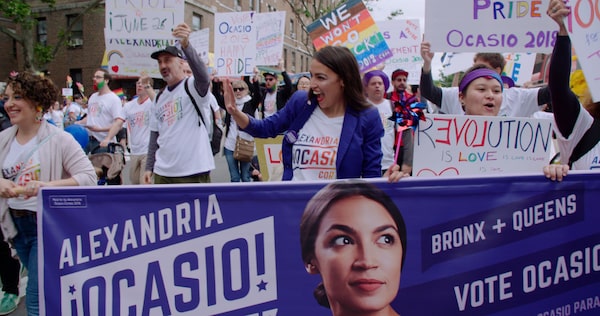
Alexandria Ocasio-Cortez is a primary subject of the new Netflix documentary Knock Down The House.Netflix
Doing the rounds of the late-night talk shows recently – an arena in which she is a much-prized star guest - Alexandria Ocasio-Cortez told an interesting story. A Republican member of Congress had moseyed over to her and asked bluntly, “Is it true you got $10-million from Netflix?”
Ocasio-Cortez told the story with a measure of disbelief. Yet she made her point – she spooks Republicans. They don’t get her, don’t understand why she was elected. And no, she didn’t get US$10-million from Netflix.
What she got is a starring role in a wonderful new Netflix documentary, Knock Down the House (streaming on Netflix Canada as of May 1), but she didn’t know that when the filming started in late 2017. Nobody did. Nobody knew that after the U.S. midterms, Ocasio-Cortez would soon be known simply as AOC.
Documentarian Rachel Lears set out to follow four women who were challenging incumbent Democrats in the primaries ahead of the 2018 midterm elections: Amy Vilela in Nevada, Cori Bush in Missouri, Paula Jean Swearengin in West Virginia and Ocasio-Cortez in New York. They didn’t all get elected, and, as the whole world knows by now, Ocasio-Cortez was the one who seemed to embody the entire unlikely movement. What you see when you watch this doc is not adulatory or fawning. It’s a rousing story about ordinary people rising up to challenge establishment figures and aiming to change establishment politics.
The film opens with AOC getting ready to do a public appearance. “Getting ready, for a woman, involves so many decisions about how you’re going to present yourself to the world,” she mutters to the mirror. Then she points out that men can simply choose a suit or rolled sleeves. That’s all they need.
Soon, a background voice on TV is heard asking, “Are the progressives going to make the Democratic primaries messy?”
The answer, obviously, is “Yes.”
We see Vilela, a fiercely determined woman, in Nevada, knocking on doors alone, telling voters she wants “Medicare for all.” Her candour and conviction are awe-inspiring. “This is not a game for me,” she says, driving in her car to another campaign event.
“They’re calling me a Marxist. I don’t even know what a Marxist is.”
Swearengin in West Virginia is seen looking around at a small group of supporters. “We’re not rich white dudes in suits,” she tells them. “I’m a coal miner’s daughter.” In truth, she’s revving herself up. She’s a tad nervous and unsure about addressing a large crowd. But when she does, she nails it. Her outrage is plain-spoken. She tells the crowd that it is criminal that in her district, people have to pay to get a glass of clean water. There is pollution everywhere. Cancer rates are high, and nobody in power seems to care.

Cori Bush, a pastor and nurse, challenged incumbent Lacy Clay in Missouri.Netflix
In Missouri, Bush is also a little uncomfortable with the spotlight. She’s a tad hesitant about the photos being taken for her campaign literature. But she’s also a nurse and a pastor, was once homeless, and feels it is her moral duty to run for office. Hers is perhaps the toughest race. She is splitting the black vote in trying to persuade locals to vote for her and not the sitting U.S. representative, Lacy Clay.
One fascinating insight Canadians might be unaware of is that all four candidates received huge help from the organizations Brand New Congress and Justice Democrats, with the former staffed mainly by people who worked on Bernie Sanders’s 2016 campaign. The grassroots movement that fuelled these candidates did not appear out of nowhere. There is a highly organized campaign, funded by small donations, to have Congress reflect working voters.

Ocasio-Cortez is at the centre of many of the film's most compelling moments, writes John Doyle.Netflix
Throughout, the most compelling sequences often feature AOC, and it’s easy to see why. She’s utterly at ease with herself. She might have started out a little shy, a little wary of the daily grind of retail politics, but her savvy and her hard work are astonishing. We see her doing her day job in a New York bar and then campaigning and organizing. There is nothing phony about her. She’s a once-in-a-lifetime figure, a waitress from a neighbourhood bar who leads an uprising and is stunningly skilled at doing so.
And yet, Knock Down the House tells you this isn’t a one-time phenomenon in U.S. politics that started and ended in 2018. While the pundits on CNN, Fox News and other outlets blather on about the minutiae of the Trump era, something else is stirring, and soon, perhaps, nothing will ever be the same again.
Watch this, and you’re watching a revolution, one that will make a lot of viewers stand up and cheer.